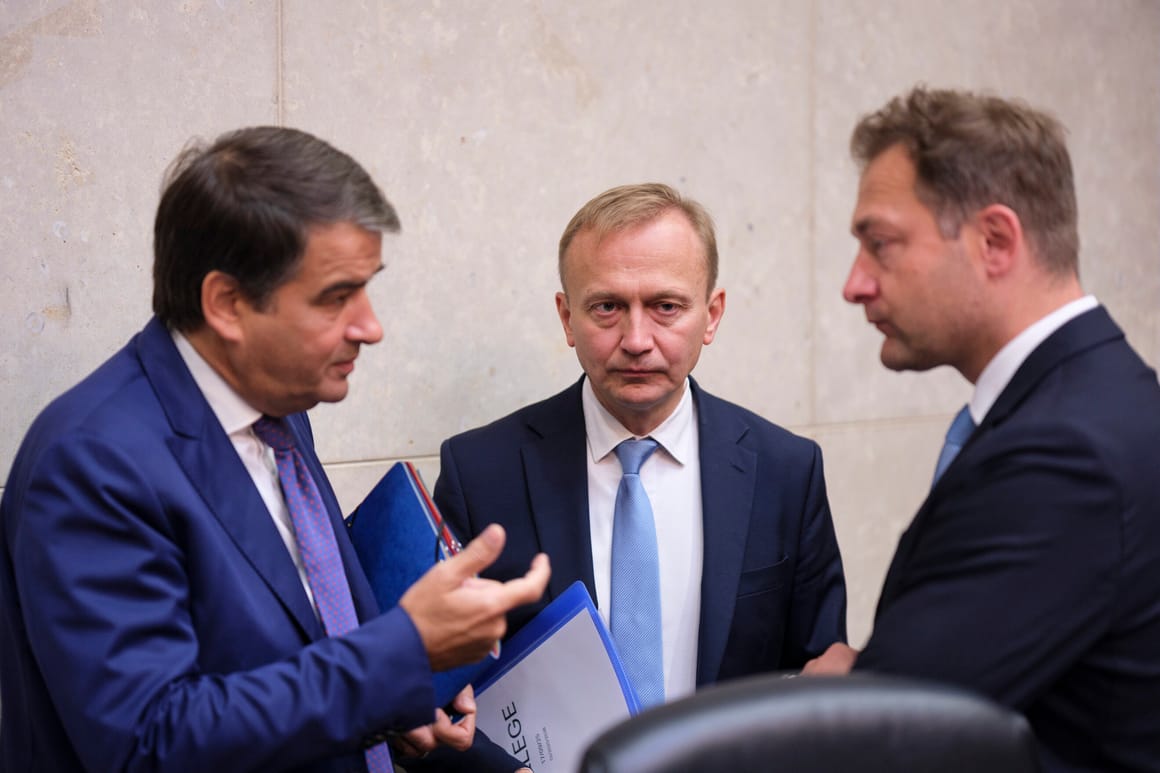Politics
European Parliament Challenges Von der Leyen on Budget and Emissions

Lawmakers within the European People’s Party (EPP) are threatening to derail two significant legislative initiatives proposed by Ursula von der Leyen, the president of the European Commission. This internal conflict complicates her efforts to maintain authority over the EU’s most influential institution. The EPP, the largest political group in the European Parliament, has raised concerns over von der Leyen’s plans for the EU’s seven-year budget and her commitment to reducing greenhouse gas emissions by 2040.
The EPP’s opposition centers around proposals to consolidate agriculture subsidies and funding for the EU’s less affluent regions into centralized pots managed by national governments. Critics assert that this approach would diminish financial support for farmers and reduce local oversight of EU funds. The discord highlights von der Leyen’s precarious position as she prepares for two no-confidence votes in Parliament scheduled for October 19, 2023. While she is anticipated to emerge unscathed, the challenges from her own party are proving more difficult to navigate than external opposition.
Discontent within the EPP has been brewing since July, when von der Leyen unveiled her budget plan, effective from 2028. Lawmakers from both the EPP and the Socialists and Democrats have threatened to reject aspects of the proposal and demand revisions. EPP chief Manfred Weber has attempted to reconcile differences within his party, describing the current discussions as “discussing the issues among friends.” He acknowledged that some members are discontented with the national reform program, asserting that the EPP is both a party of mayors and farmers, and that there is a need for a more satisfactory plan.
In response to the growing unrest, the Commission has committed to engaging in formal discussions with key EPP representatives. Budget Commissioner Piotr Serafin, Agriculture Chief Christophe Hansen, and Regions Commissioner Raffaele Fitto have pledged to establish working groups with EPP Members of the European Parliament (MEPs) to address concerns about agricultural funding, payments to poorer regions, and the budget’s overall structure.
“There’s a problem with the architecture of the Commission’s proposal; it’s simply not good,” remarked EPP agriculture coordinator Herbert Dorfmann. “If the Commission proposes something without a majority, it has to change.” Tensions escalated during a meeting where several EPP lawmakers expressed their intent to reject the proposal entirely. Hansen reportedly warned them that rejection could result in reduced funding for agriculture.
The EPP believes that consolidating funds into a single pool under central government control undermines regional leaders and compromises financial support for farmers. Several EPP officials indicate a potential resolution at the upcoming Parliament session may involve rejecting the proposal outright or seeking internal amendments.
In addition to budgetary concerns, the EPP is grappling with internal divisions regarding climate policy. A meeting on October 18, 2023, aimed at determining the party’s stance on the 2040 emissions reduction target, revealed significant discord. The EU faces pressure to establish a clear emissions goal before the COP30 climate summit in Brazil in November, with the risk of undermining its international credibility if it fails to present a unified front.
While von der Leyen affirmed her commitment to climate policy in her recent State of the Union address, the EPP remains divided. Some party members advocate for scrapping the proposed 90% emissions reduction target, while others suggest a lower goal. “There’s no majority for a 90% cut,” stated EPP climate lead Peter Liese. The party is wary of losing support to far-right factions if it continues to pursue stringent climate measures.
The EPP’s indecision is stalling negotiations in Parliament, posing a risk that the EU may arrive at COP30 without a coherent strategy. The group plans to delay two upcoming committee votes on climate matters, pausing internal discussions until EU leaders convene in Brussels on October 23, 2023.
The unfolding events reflect the complexities and challenges facing von der Leyen as she navigates both budgetary reform and climate policy within a fragmented political landscape.
-

 Top Stories3 months ago
Top Stories3 months agoTributes Surge for 9-Year-Old Leon Briody After Cancer Battle
-

 Entertainment4 months ago
Entertainment4 months agoAimee Osbourne Joins Family for Emotional Tribute to Ozzy
-

 Politics4 months ago
Politics4 months agoDanny Healy-Rae Considers Complaint After Altercation with Garda
-

 Top Stories4 months ago
Top Stories4 months agoIreland Enjoys Summer Heat as Hurricane Erin Approaches Atlantic
-

 World5 months ago
World5 months agoHawaii Commemorates 80 Years Since Hiroshima Bombing with Ceremony
-

 Top Stories3 months ago
Top Stories3 months agoNewcastle West Woman Patricia Foley Found Safe After Urgent Search
-

 Top Stories5 months ago
Top Stories5 months agoFianna Fáil TDs Urgently Consider Maire Geoghegan-Quinn for Presidency
-

 World5 months ago
World5 months agoCouple Convicted of Murdering Two-Year-Old Grandson in Wales
-

 World5 months ago
World5 months agoGaza Aid Distribution Tragedy: 20 Killed Amid Ongoing Violence
-

 World5 months ago
World5 months agoAristocrat Constance Marten and Partner Convicted of Infant Murder
-

 Top Stories4 months ago
Top Stories4 months agoClimbing Errigal: A Must-Do Summer Adventure in Donegal
-

 Top Stories4 months ago
Top Stories4 months agoHike Donegal’s Errigal Mountain NOW for Unforgettable Summer Views








